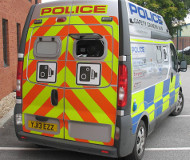1/3/2018
UK Motoring Group Attacks Misplaced Police PrioritiesAlliance of British Drivers calls for release of accident reports to determine the true number of incidents caused by ordinary speeding.

A group representing the interests of the UK motoring public on Tuesday called on the British government to provide more honest speeding statistics. The Alliance of British Drivers (ABD) cited official figures in questioning the usefulness of deploying thousands of speed cameras nationwide to ticket motorists for venturing a few miles per hour over the speed limit.
"So who are the drivers who crash and kill above the speed limit?" ABD spokesman Nigel Humphries asked in a statement. "Listening to the government, local authorities, the enforcement industry and vocal campaigning organizations, the impression given is that it is largely normally law-abiding drivers traveling just above the speed limit who are mowing down pedestrians and cyclists left, right and center. This is clearly what they intend us to believe."
The group pointed to Reported Road Casualties Great Britain tables that show nine out of ten serious or fatal accidents involved vehicles that were not speeding. Of the remaining 217 fatal accidents in the UK, at least one quarter involved fleeing felons, drivers who were high or stolen vehicles. Some 16 percent of drivers who crashed were drunk. Eight percent were unlicensed or "inexperienced." The group slammed the government scorekeepers for not digging deeper into the numbers to track how many accidents were caused solely by exceeding the posted limit.
"For decades now there has been a huge campaign by the authorities to convince us that sober, otherwise legal drivers exceeding the speed limit are a major cause of death and injury," Humphries said. "A huge, well-funded industry with vested interests has built up around that 'fact' being true; but clearly this 'truth' is very much in doubt."
The group is calling on the government to release the individual accident reports from the 217 fatal and 1238 serious injury accidents to allow an independent analysis of the data.
In 2016, just under two million speed camera tickets were mailed out in Great Britain. Ticket recipients who had their case adjudicated in the court system saw the potential cost skyrocket last April with the introduction of income-based fines. Ordinary mailed tickets remained £100 (US $135), but new sentencing guidelines gave judges the discretion to charge up to 75 percent of a driver's weekly paycheck when accused of traveling just 1 MPH over the posted speed limit, up to a maximum of £2500 (US $3390). More serious speeding accusations raise the potential fine to 175 percent of weekly income, up to the £2500 cap.
This means that low-level speeders earning £174,000 (US $235,000) per year would face the maximum fine, while those traveling over 100 MPH could see a £2500 fine if they earn £74,000 (US $100,000) annually. If the judge cites multiple aggravating factors, the maximum fine can be imposed on a driver earning as little as £19,000 (US $25,000) a year.


